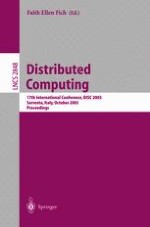2003 | OriginalPaper | Buchkapitel
Using Conditions to Expedite Consensus in Synchronous Distributed Systems
verfasst von : Achour Mostefaoui, Sergio Rajsbaum, Michel Raynal
Erschienen in: Distributed Computing
Verlag: Springer Berlin Heidelberg
Enthalten in: Professional Book Archive
Aktivieren Sie unsere intelligente Suche, um passende Fachinhalte oder Patente zu finden.
Wählen Sie Textabschnitte aus um mit Künstlicher Intelligenz passenden Patente zu finden. powered by
Markieren Sie Textabschnitte, um KI-gestützt weitere passende Inhalte zu finden. powered by
The condition-based approach to solve consensus has initially been developed in the context of asynchronous systems. It identifies a class of acceptable conditions on the set of input vectors that, when satisfied by the actual input vector, are exactly the conditions that allow to solve consensus despite up to t faulty processes. This paper investigates the use of conditions to solve consensus in synchronous systems prone to process crash failures. It first shows that for any acceptable condition there is a condition-based protocol solving uniform consensus that enjoys the following property: when the input vector belongs to the condition, it terminates in a single round if no process crashes, and in two rounds otherwise. When the input vector does not belong to the condition, the actual number of rounds is upper bounded by t+1 (it actually depends on both the crash pattern and the input vector). The paper then extends the previous protocol to combine early decision with the condition-based approach. It presents a general protocol that enjoys the previous properties (decision in one or two rounds) when the input vector belongs to the condition and terminates in at most (t + 1, f + 2) rounds when the input vector does not belong to the condition (where f is the actual number of faulty processes). Finally, the paper presents corresponding matching lower bounds. It shows that acceptable conditions are the only ones for which a consensus protocol can enjoy the previous properties.
